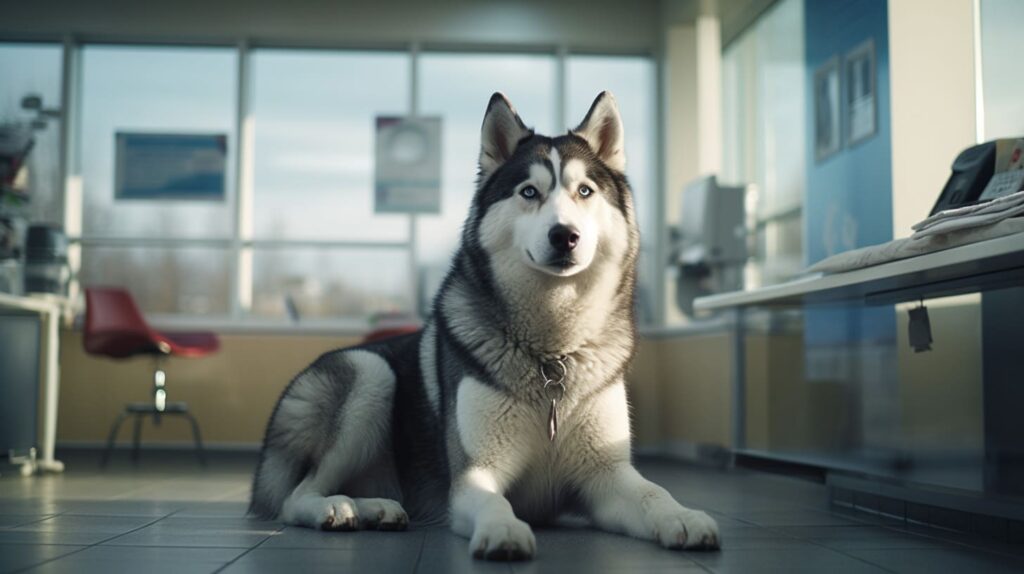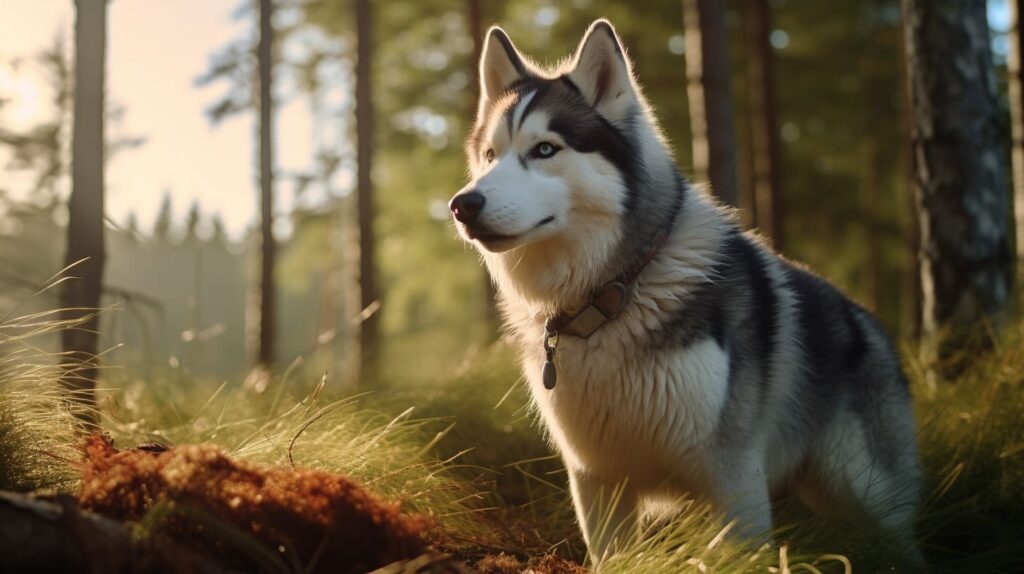Hello there, fellow Husky enthusiasts! We’ve all been captivated by the mesmerizing gaze of a Siberian Husky, their wolf-like features concealed by a fur coat softer than your favorite blanket and a personality more bubbly than champagne. But let’s face it, our Husky friends are more than just their Instagram-worthy faces – they’re a bundle of energy, love, and, sometimes, a couple of health concerns.
Ensuring our Huskies’ health is as radiant as their piercing blue eyes is a responsibility and a testament to our love for these furry pals. After all, a healthy Husky is a happy Husky, right? And who doesn’t want to see their Husky’s tail wagging faster than a high-speed blender whenever they walk in the door? So, buckle up, folks! We’re about to embark on a journey into the world of Husky health, unraveling the mysteries of their well-being and learning how to keep those tails in perpetual motion. Our commitment to our Huskies isn’t just about sharing our lives with them but also ensuring their lives are filled with as much joy and health as they bring to ours.
Recognizing Common Husky Health Issues
If you’re a Husky parent, you know these furballs are as spirited as they are gorgeous. But, like every breed, our beloved Huskies have their share of health hiccups. Don’t panic, though! We’re here to arm you with the knowledge you need to handle these health hurdles, all while keeping that Husky tail wagging.
Hip and Elbow Dysplasia – Not a Dance Move!
Let’s start with hip and elbow dysplasia. No, it’s not the latest dance craze sweeping the nation – we wish! Instead, it’s a common health issue for our Husky buddies. In layperson’s terms, it’s a funky fit between the ball and socket of your Husky’s hip or elbow joint. This can lead to discomfort, pain, and even arthritis over time.
You might be thinking, “How do I know if my Husky is suffering from this not-so-cool move?” The signs can range from a subtle change in their stride to a noticeable limp. If your Husky is less keen on those long walks or park playdates, it might be time to chat with your vet.
Eye Problems – Your Husky isn’t winking at you!
Next up, eye problems. Before you get all fluttery, that’s not a flirtatious wink from your Husky – it’s more likely a sign of an eye issue. Huskies, with those stunning ice-blue, brown, or even mismatched peepers, can be prone to conditions like cataracts, corneal dystrophy, and progressive retinal atrophy.
If you notice your Husky bumping into furniture, squinting, or their eyes looking cloudy, it’s time to play detective. There is no need for a magnifying glass; a quick vet trip should do the trick!
Skin Conditions – It’s not just a fashion statement
Finally, we come to skin conditions. You’re not alone if you’ve ever mistaken your Husky’s flaky skin for a snow shower or their constant scratching for a new interpretive dance. Huskies are known for their lush, thick coats, but they can be susceptible to skin issues beneath that fabulous fur.
From allergies to zinc-responsive dermatosis, these conditions can be itchy and uncomfortable for your Husky. If you see excessive scratching, bald patches, or skin color or texture changes, it may be more than just a fashion statement.
So, there you have it, fellow Husky enthusiasts! Recognizing common Husky health issues is the first step towards ensuring your fluffy companion stays as healthy and happy as can be. Remember, when in doubt, reach out to your vet – they’re the real Sherlock Holmes of pet health!
Treating Common Husky Health Issues
Whoa there, Husky lovers! We’re about to venture into the slightly less fun but oh-so-important world of our fur buddies’ health. Don’t worry; I promise to keep it as light-hearted as a husky chasing its tail. Let’s dig into the nitty-gritty of treating common Husky health issues.

When to make a vet appointment – No, not a playdate!
First things first, folks. We all know how our Huskies love socializing, but unfortunately, the vet’s office isn’t a dog park. However, try explaining that to a Husky!
In all seriousness, knowing when to make a vet appointment is crucial. You’d be surprised how reasonable our four-legged friends are at hiding their discomfort. If your Husky is acting out of character, limping, losing weight, or experiencing tummy troubles, that’s your cue to work like a responsible human and consult a vet. Remember, it’s not a playdate, but your fur baby will thank you for it later… or they won’t hold a grudge for too long!
Medications and treatments – Not just for humans!
Next up, we’re talking medications and treatments. And no, I’m not referring to the pill you hide in your Husky’s favorite treat when they’re not looking!
In the world of Husky health, some problems require a little more than a belly rub and a “good boy!” to fix. Our fur friends might need serious meds or treatments from hip dysplasia to eye conditions. So, if your vet prescribes something, don’t fret! They’re not trying to turn your Husky into a walking pharmacy. They’re just doing their best to keep them healthy and happy. Just remember to administer those meds with a hefty dose of love (and maybe a treat or two for good measure).
The role of diet and exercise – Not just for the New Year’s resolution
Last but not least, let’s talk about diet and exercise. I know what you’re thinking: “Isn’t that topic for January 1st when I’m guilt-ridden from all the holiday treats?” Well, yes, but it’s also super important for our Huskies!
A balanced diet and regular exercise are not just some fancy buzzwords thrown around by personal trainers. They’re essential for our Huskies, who, by the way, could probably out-train most of us on any given day!
Feeding your Husky a balanced diet with proper nutrients can help prevent various health issues. Similarly, regular exercise (and no, I don’t mean a stroll to the fridge and back) can keep your Husky’s weight in check and their joints in top shape.
So, there you have it, folks! The down-low on how to treat common Husky health issues. Remember, a happy Husky is a healthy Husky. And a healthy Husky makes for a happy hooman. It’s a win-win!
Prevention of Common Husky Health Issues
Alright, fellow Husky enthusiasts, let’s dive into the nitty-gritty of keeping our furry friends as healthy and spry as possible. Because let’s face it, preventing health issues is far better (and less tear-inducing) than treating them.
Regular Vet Check-ups – The Husky Health MOT
First, a healthy Husky is a happy Husky, and regular vet check-ups are the key to that happiness. Think of it as your Husky’s health MOT. You would only let your car go with a routine check-up, would you? (If you just answered ‘yes’ to that, we need to have a severe chat about car maintenance…)
Every Husky should have a thorough health check at least once a year. Now, you can take your time to the vet whenever your Husky sneezes or has a bit of a dodgy tummy. But regular vet visits will help you spot potential health issues early, and we all know prevention is better than cure. Plus, your vet might give you some treats for being a responsible dog parent. (Okay, the treats are usually for your Husky, but we can dream, right?)
Healthy Husky Diet – No, pizza doesn’t count!
Now, onto the fun part: food! We all know the temptation of those big, puppy-dog eyes begging for a slice of your pizza. But, as delicious as it may be, pizza doesn’t count as a healthy Husky diet (much to your dog’s disappointment, I’m sure).
A balanced diet is crucial for the health of your Husky. This means lots of high-quality protein (sorry, pepperoni doesn’t count), fruits and vegetables, and just the right amount of fat. And remember, portion control is critical! Huskies are known for their athleticism but can’t outrun a bad diet.
Exercise and Mental Stimulation – More than just tail chasing
Lastly, let’s talk about exercise and mental stimulation. Yes, it’s more than just tail chasing and endless games of fetch (though is there anything more entertaining than watching your Husky try to catch its tail?).
Huskies are an active and intelligent breed. They need plenty of physical exercise to keep their bodies strong and healthy. However, mental stimulation is just as important. This could be anything from puzzle toys to doggy IQ tests. And who knows, your Husky might be the next Einstein of the dog world.
In conclusion, regular vet check-ups, a healthy diet, and plenty of exercise and mental stimulation are the secret ingredients to a long, healthy life for your Husky. If you’ll excuse me, I have a game of tail-chasing to supervise…
Taking Care of a Husky with Health Issues
So, your beautiful, howl-at-the-moon, tail-chasing Husky pal has some health issues. Don’t sweat it, friend! Let’s wear our superhero capes and become the best caregivers these furballs have ever seen.
Adapting your home – A doggy-friendly fort
First things first – our homes. These are not just human territories anymore. It’s time to create a Husky-friendly fort that even Superman would be jealous of.
Think of it like setting up a dinner party for a vegan friend, but instead, you’re inviting over a husky with health issues. You wouldn’t serve steak at that dinner party now, would you? Similarly, you want to remove potential hazards and ensure everything is comfortable for your Husky.
Keep water bowls filled with fresh water (because hydration is as essential for them as your morning coffee is for you). Ensure their bed or crate is comfortable and not causing undue strain. And remember, clear pathways are your best friend, just like a clear schedule on a Monday morning!
Emotional support – Yes, dogs have feelings too
Think again if you thought dogs were all tail wags and slobbery kisses. They have feelings, too! And just like you’d want a tub of ice cream and a comforting hug after a bad day, they need our emotional support when dealing with health issues.
Spend quality time with them, talk to them (yes, talk! They may not understand the words, but they sure do understand the love), and shower them with affection. It all adds up: a little belly rub here, a gentle ear scratch there. Think of it as their version of a spa day (and who doesn’t love a good spa day?)
Living a whole and happy life – Because every dog has its day
Now, let’s forget about those health issues for a second. A Husky with health problems is still a Husky – an energetic, fun-loving, and intelligent breed. They still deserve to live a whole and happy life, and who better than you to make that happen?
Take them on walks still, play fetch in the park (don’t be too surprised if they don’t bring the ball back; they’re just playing hard to get), and don’t forget the treats! Even with health issues, charms are still on the table; make them healthy.
Remember, just because they have health issues doesn’t mean they’ve lost their spirit. They’re still the same tail-chasing, fun-loving Huskies they’ve always been. And as their superhero, it’s your job to ensure they keep feeling that way!
So, there you have it, friend. Remember, with a little bit of love, a dash of patience, and a sprinkle of care, you can ensure that your Husky lives their best life, health issues or not. And who knows, they might even let you join their tail-chasing fun!
Husky Health Myths Busted
You know what they say about Huskies, right? They can live on snow alone; they’re just being dramatic, and yes, they are that awesome… Well, hold your sled, folks! It’s time to separate the Husky health myths from the cold, hard facts. So, let’s dive nose-first into the snowdrift of misinformation and clear the air, shall we?
Debunking common misconceptions – No, Huskies can’t live on snow alone
Now, I know what you’re thinking. “But Huskies are snow dogs; they must be able to survive on snow alone, right?” Well, not quite. While it’s true that these furry snow-lovers are built to withstand frigid temperatures, the idea that they can live on snow alone is all bark and no bite. Just as we can’t survive on water alone, Huskies need a balanced diet to stay healthy. Snow, while it might make for a refreshing snack or a fun plaything, doesn’t provide the nutrients they need. So, remember, while a snow cone might be a fun treat on a hot day, remember to feed your Husky a balanced doggy diet!
Clearing up confusion – No, your Husky isn’t just being dramatic
Yes, we’ve all seen the viral videos of Huskies throwing tantrums and acting like they deserve an Oscar for their performances. But before you label your Husky as a dramatic diva, it’s essential to understand that these behaviors are often a form of communication. Unlike their human counterparts, dogs can’t tell us when something’s wrong or uncomfortable. Instead, they use their behavior to express themselves. If your Husky seems like they’re auditioning for a role in a daytime soap opera, it could be a sign that something’s up. Remember, your Husky isn’t trying to win a Tony Award; they’re just trying to tell you something!
Setting the record straight – Yes, Huskies are that awesome
Now, this is one myth we can sink our teeth into! Huskies are indeed as awesome as they are made out to be. These dogs are intelligent, friendly, and full of energy. They’re great companions and love a good adventure. Plus, let’s be honest, their stunning blue eyes and fluffy coats are just the icing on the cake. So, while we’ve busted some Husky health myths today, let’s end on a high note by confirming one thing: Huskies are that awesome!
And there you have it, folks! Our sleigh ride through the world of Husky health myths has ended. Remember, while Huskies are wonderfully unique creatures, they’re not immune to the same health concerns as other dog breeds. It’s essential to keep yourself informed and always consult a vet if you need clarification. After all, a healthy Husky is a happy Husky!
The Happy and Healthy Husky: A Husky Paw-rent’s Ultimate Guide
Well, fellow Husky enthusiasts, we’ve sled our way down the snowy trails of Husky health know-hows, and oh boy, what an adventure it’s been! We’ve sniffed out the crucial nuggets of knowledge and paw-sitively essential tricks to keep our Huskies healthy, howling, and, most importantly, happy.
Being a responsible Husky parent isn’t all tail wags and belly rubs, though; let’s be honest, those are pretty paw-some perks. It’s also about knowing when to say ‘no’ to those puppy dog eyes begging for another treat, ensuring they get their daily exercise – even when the weather outside is frightful – and keeping their beautiful coats brushed and shiny. It’s a big responsibility, but seeing your Husky’s tail wag in pure joy as they race around in the snow makes it all worth it.
So, as we wrap up our Husky health journey, remember: whether you’re a new Husky parent or a seasoned pro, every day is a chance to learn something new. Keep your paws on the pulse of your Husky’s health, and they’ll reward you with years of love, laughter, and, of course, those hilarious Husky ‘talking’ sessions. Here’s to you for being the best Husky parent you can be. Now go on, give your Husky a well-deserved belly rub. They’ve earned it!
Core Concepts About Common Husky Health Issues
| Core Concept | Details |
|---|---|
| Recognition of Husky Health Issues | Huskies are generally healthy but prone to certain health issues. They can suffer from Hip Dysplasia, Progressive Retinal Atrophy, Cataracts, Corneal Dystrophy, and Hypothyroidism. |
| Signs and Symptoms | Huskies with Hip Dysplasia may show discomfort or lameness in one or both rear legs. Progressive Retinal Atrophy leads to the deterioration of the retina, causing vision loss. Cataracts could cause cloudiness in the eye. Corneal Dystrophy may cause white or gray opaque areas in the cornea, and Hypothyroidism can lead to obesity, lethargy, and various skin conditions. |
| Regular Check-ups | Regular vet check-ups are crucial for Huskies. Early detection of potential health issues can significantly improve treatment outcomes and the overall quality of life for the dog. |
| Healthy Diet and Exercise | A proper diet and regular exercise can help prevent obesity and promote overall health. Huskies are active and need regular exercise to maintain muscle tone and prevent overweight. |
| Genetic Testing | Genetic testing can help identify whether your Husky is prone to certain genetic disorders. This can aid in early detection and preventative care. |
| Eye Care | Regular eye exams can help detect conditions like Progressive Retinal Atrophy, Cataracts, and Corneal Dystrophy early. |
| Thyroid Function Test | Regular Thyroid function tests can help detect Hypothyroidism early. Early detection allows for effective treatment and management. |
| Hip Dysplasia Screening | Screening for Hip Dysplasia should begin at a young age for Huskies. If diagnosed early, lifestyle modifications and treatments can help manage the condition and improve the quality of life. |
Tips for Recognizing and Treating Common Husky Health Issues
Hey there, Husky herders!
So, you’ve got yourself a Siberian surprise, eh? With those ice-blue eyes, that thick fur coat, and a personality as big as their howl. Oh boy, those howls! They could give the moon a run for its money! But, along with those gorgeous looks and charming quirks, your Huskies can sometimes come with a few health hiccups. Don’t sweat it, though. We’re here to help you navigate those husky health hurdles.
- Ziggy Stardust Eyes: Huskies are famously known for their hypnotic eyes. But, occasionally, they can be prone to eye conditions like cataracts, corneal dystrophy, and progressive retinal atrophy (PRA). If your pup starts bumping into furniture or their eyes start looking foggy, it’s time for a vet visit. Early detection can make all the difference, and various treatments are available!
- Hip Hop Hooray (or Not!): Hip dysplasia is a common issue among larger breeds, and Huskies are no exception. If your usually energetic Husky starts limping, showing stiffness or hesitates to run, jump, or climb stairs, it’s time for a hip check. Keep an eye on their movement and ensure they’re getting a balanced diet to maintain a healthy weight. In extreme cases, your vet can guide you on the best action, including physical therapy, medication, or even surgery.
- Skin-interesting Issues: Huskies are often prone to skin conditions such as zinc-responsive dermatosis and follicular dysplasia. If you notice your Husky scratching more than usual, losing hair, or developing sores or redness, it’s time to play detective. Your vet will probably prescribe a special diet or medication to help manage these conditions.
- The Chilly Chompers: Huskies can have dental problems just like us. Regular brushing (of their teeth, not their fur, although that’s important, too!) can prevent gum disease and tooth decay. If your Husky shows discomfort while eating, has terrible breath, or notices any changes in their gums or teeth, it’s time for a dental check-up.
Remember, fellow Husky lovers, prevention is better than cure. Regular vet check-ups and a balanced diet can go a long way in keeping your Husky hale and hearty.
So, there you have it! A handy guide to help you cruise through the standard Husky health hitches. Keep these tips in your back pocket, and you’ll be ready to tackle any health issues that come your way faster than a husky chasing a squirrel!






